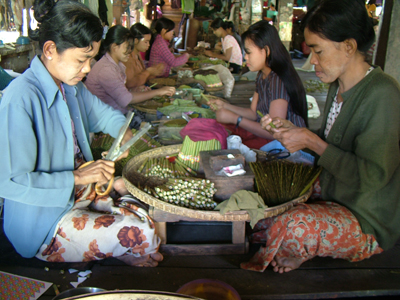
| By ZIN MIN MAUNG/ THE IRRAWADDY | Monday, February 6, 2012 |
BAGO—Burma's traditional cheroot-makers are some of the lowest earners in the country. The imbalance between their daily income and expenditures results many of them struggling with debts at high interest rates, and living in abject poverty.
“I have to work from 6 am to 10 pm for 2,000 kyat (US $2.50) per day while my 16-year-old daughter does the same for 1,000 kyat," said Aye Than, 42, a mother of three. As she speaks, she packs tobacco into cheroots—large hand-rolled cigarettes—by the dim candlelight in her house in the western outskirts of Bago [Pegu], about 90 km north-east of Rangoon.
"However, I have to pay 30,000 kyat [$37] per month on a debt of 150,000 kyat. The main reason we borrowed the money is we cannot survive without food,” she said.
She says that in 1988, she earned as much as 120 kyat for making 1,000 cheroots. But in those days, she says, she only had to spend 25 kyat for rice per day to fed her family. Today, a skilled cheroot maker earns 2,000 kyat per day to make 1,000 cheroots, but spends 1,000 kyat of that on rice.
Aye Than says that after her husband passed away five years ago, she stopped sending her son to school after his matriculation examination, and had to withdraw her daughter from school while she was still in the eighth grade.
"I needed them to work,” said Aye Than.
 |
| Women work 16 hours a day making cheroots at a makeshift factory on the outskirts of Bago. (PHOTO: Irrawaddy) |
Cheroot-making is one of the most common occupations in Bago with about 20 factories. Almost every female in the town has rolled cheroots at some point in their lives—or, one should say, most of the poor and working-class females have.
They work at factories or at home whereby the factory provides them with ground Virginia tobacco, filter tips and paper labels.
Of course many of the women have children and must care for them as well as providing school fees. If the factory closes, for example due to floods, the cheroot-makers don't get paid. If the factory owners reject the workers' cheroots—if they are moist or off-color—again they don't get paid.
Most of the women have found no alternative to borrowing money from loan sharks at crippling interest rates.
"If we borrow 30,000 from a moneylender, she will immediately deduct 6,000 and give us 24,000 kyat,” said Aye Than. “Then we have to repay 1,000 kyat per day for 30 days.
"If we can't repay it in full within 30 days, we have to pay compound interest," she adds.
With no days off, no leisure time, no daylight and a poor diet, the average cheroot-maker's misery is exacerbated by bad health.
“I would love to take a day off, but my children would go hungry the next day,” Aye Than said.